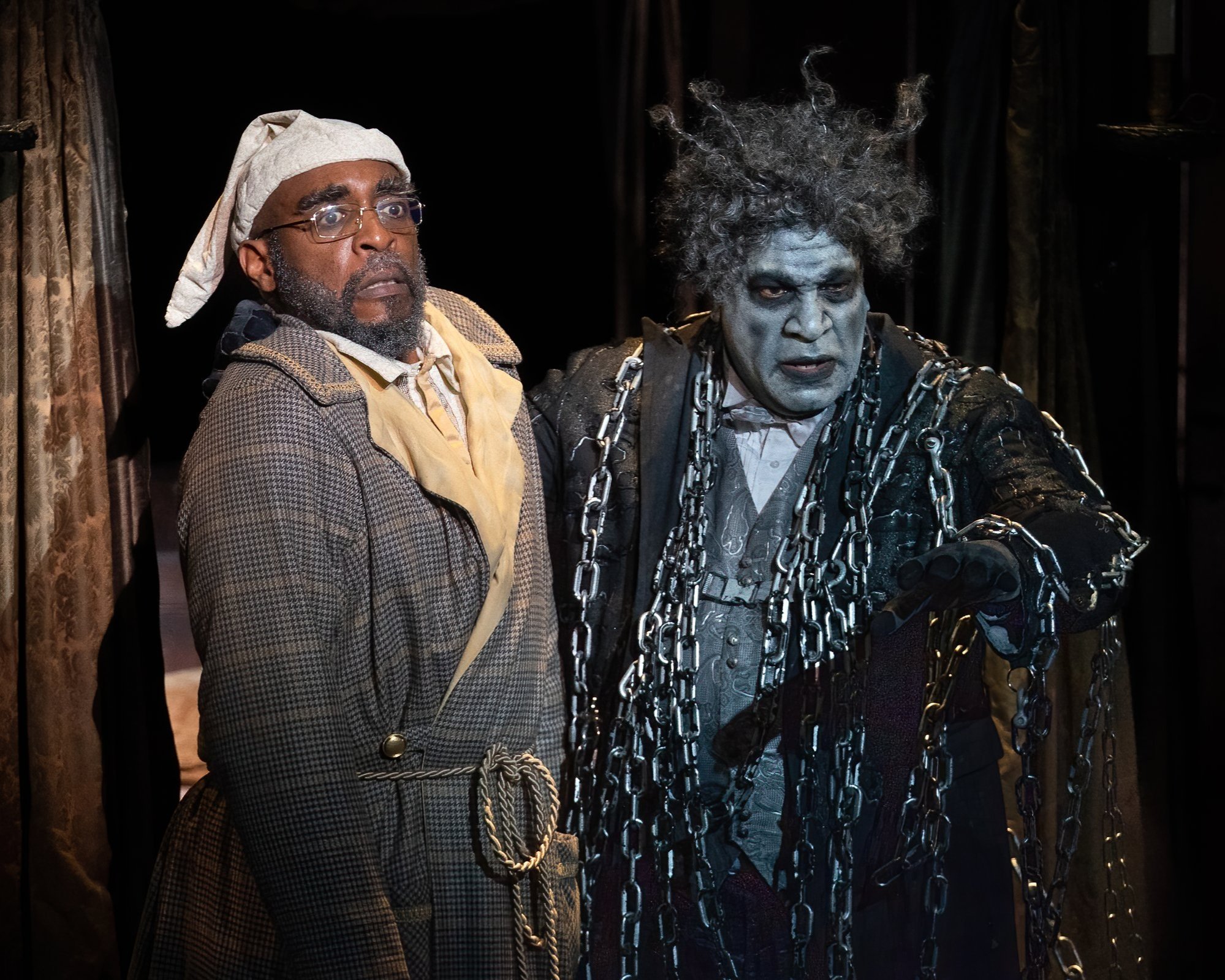Marc Pouhé Steps Back Into the Spotlight After a Second Transplant

In a city that prides itself on resilience, few stories embody Austin’s artistic heartbeat more powerfully than that of actor Marc Pouhé. Returning to the stage after a second kidney transplant, Pouhé is not simply reclaiming his place in Austin theatre—he’s reshaping what it means to endure, to evolve, and to lead.
Pouhé has been a force on Austin stages for more than two decades. The Texas State University alum (back when it was still Southwest Texas) burst into the theatre scene with breakout college performances—Paul in Six Degrees of Separation and Billy Flynn in Chicago—the kind of back-to-back roles that announce a career. By 2004, he was onstage with Austin Shakespeare, the company he now proudly serves as Vice President of the Board, and launched a professional run that would make him one of the region’s most magnetic classical actors.
But Pouhé’s story is not just about artistic triumph. It’s about survival—twice over.
A Career Interrupted, A Life Saved
Just a few years into his career, life shifted dramatically. In 2009, Pouhé faced his first bout of kidney failure, forcing him away from the industry he loved. The actor who once moved effortlessly between Shakespearean verse and contemporary drama suddenly found himself fighting a much more urgent battle.
“I took a break for three years… just to stay alive,” he says. Dialysis became routine. Acting became memory.
His brother ultimately stepped forward—despite not being a match—and participated in a three-kidney paired exchange to ensure Pouhé received a transplant in 2012. And like every great actor, Pouhé made a dramatic return, landing back on Austin stages with renewed purpose.
“Art always finds a way,” he says. And it did. He rebuilt his career, booking Shakespeare, contemporary work, and scoring a pivotal role in ZACH Theater’s A Christmas Carol as Scrooge beginning in 2019. But in fall 2023, Pouhé’s transplanted kidney began to fail. This time, the medical system was different — and in many ways, more accessible — thanks to healthcare expansions that didn’t exist during his 2009 crisis. Even so, the fight was grueling.
“To put it plainly, transplanted organs are not permanent,” he explained. “My original transplant had reached the end of its life. It lasted about 11 years, which is shorter than I would've wanted, but, you know, kidneys are not permanent. Transplanted organs are not permanent. I dealt with a second bout of kidney failure. The second time was a lot different because Obamacare didn't exist in 2009. So that was a big challenge — just being able to get the care that I needed, especially towards the beginning.”
What was permanent, however, was community.
By sharing his health journey publicly—a vulnerable step he took specifically to help others—Pouhé found the Austin theatre community rallying around him. And in October 2024, almost exactly one year after his new search began, he received a second transplant.
A year later, he stepped back into the rehearsal room.
Pouhé’s first post-transplant performance was in Fat Ham at Austin Playhouse. Now, he’s returning to his artistic home, Austin Shakespeare, where he will appear in a staged reading of Athol Fugard’s My Children! My Africa! — a piece he calls “powerful, heartbreaking, and inspiring.”
The production, though technically a reading, is staged with intention, movement, and full emotional commitment. “The only difference is the script in our hands,” he says. “Everything else is full performance. When people think of readings, they just think of people either sitting around a table or standing behind music stands and just reading stage directions. Our director, Ann Ciccolella, does not do that. She really wants it to be a fully costume production, with movement. I mean, the only thing that's really different from a full production emotionally is that we don't have a month to rehearse.”
For all the roles Pouhé has played — kings, villains, lovers, revolutionaries — the one he speaks of most passionately is the role he plays for young Black audiences.
“My goal in every performance is to encourage more Black people, more young people, to see shows,” he says. Because too often, Shakespeare audiences skew older and white. One of his most cherished memories came during A Christmas Carol, when a group of teenagers from an early college prep program waited to meet him.
“The way they looked at me… like I was Michael Jordan or Superman,” he paused. “I felt moved to show them that the arts belong to them too.”
Representation is not abstract for Pouhé. It’s lived, hard-earned, and deeply felt.
“I’m not a ‘pull the ladder up behind me’ person; I want everybody to grow,” he said with a laugh. “Because if not, then it's like, ‘well, yeah, he made it. Good for him.’ I'm not gonna do this forever, and I get sick every 10 years.”
He beams when he speaks of the current generation of Black students at Texas State — entire casts of Black actors, Black faculty, opportunities that didn’t exist when he trained.
“When I was at Texas State, I was one of four or five Black men in the entire department, and I was one of only two that ever got cast in anything,” he recalled. “The other gentleman was a musical theater genius who is working on Broadway now. I was just the guy who just decided to pick up acting and put everything I could into dramas, and was very fortunate. Going back now, there were two productions, and there was an entire production cast entirely with Black students. And there were Black faces and Black professors, and all of those things that I wish I could have had 20, 25 years ago. I am so happy to see 10 or 15 of me that are 20 years behind me, as opposed to one of me who always gets called for whatever role they want. It doesn't help me to be the one Black guy that gets to do all the classical theater or to get to do all these roles.”
A Man Changed, Yet Unchanged Where It Matters
In My Children! My Africa!, Pouhé plays Mr. M, a teacher who believes education — not revolution — is the path to freedom. His young student, Thami, believes liberation demands upheaval. As Pouhé researched the role, he couldn’t help but see the parallels between apartheid-era South Africa and modern America.
“Some of the trouble and the turmoil that you see then is the power structure realizing that they're going to lose power and ramping up their rhetoric, ramping up their violence, or ramping up their punishment,” he elaborated. “We're seeing some of that reflected in our modern world today, here in America. That never went away, but things that we thought were progressing since the 1960s, since the end of segregation, we thought were 50 years of progress. Even when it came to the culmination of America waking up during the summer of 2020, there's a backlash. Every time there's any kind of Black advancement or advancement by people of color in this country, there's always a backlash.”
But Pouhé’s fire — the revolutionary spark he sees in Thami — has not dimmed. It has simply matured. And now, he brings that fire back to the stage.
Nick Bailey is a forward thinking journalist with a well-rounded skill set unafraid to take on topics head on. He now resides in Austin, TX and continues to create content on a daily basis.





